Backyard Batting Cage Cost Comparison
When it comes to setting up a backyard batting cage, there’s a wide range of options available depending on your budget and training goals. Whether you’re building a basic cage for casual fun or a pro-level training space, this guide will break down what you get at the cheap, mid-range, and premium levels.
We also recommend saving this in-depth guide: How much does building a backyard batting cage really cost?
This post is brought to you by CageList.com — the Airbnb for backyard batting cages. Have a cage? List it here and start earning by renting it to local players who need a place to train.
💸 Cheap Backyard Batting Cages ($500 – $1,500)
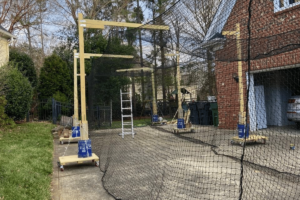
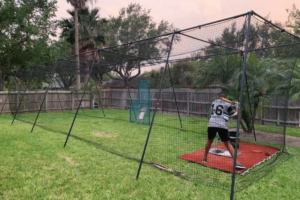
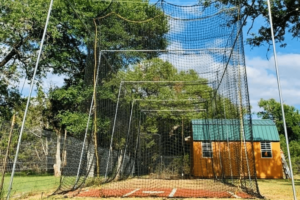
Ideal for: Beginners, families, or anyone needing a portable, short-term setup.
- Frames: Typically PVC or aluminum. Lightweight and easy to assemble but not very durable long term.
- Netting: Polyethylene netting — affordable but prone to wear.
- Size: Common sizes are 35–50 feet. Great for short toss but limited for full-distance hitting.
- Installation: DIY-friendly and often portable.
Pros: Budget-friendly, easy to move, fast to assemble.
Cons: Lower durability, minimal safety features, often too small for serious training.
⚾ Mid-Range Backyard Batting Cages ($1,500 – $5,000)
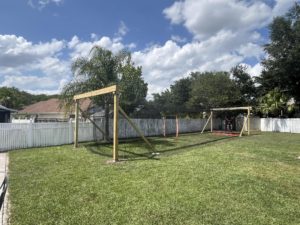
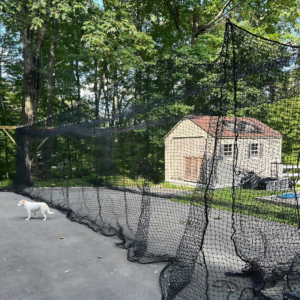
Many mid-tier cages include retractable netting, stronger frames, and optional upgrades like pitching machines or lighting.
Ideal for: Regular training, aspiring players, and backyard setups that need more space and strength.
- Frames: Steel or galvanized steel — durable and weather-resistant.
- Netting: UV-protected nylon with heavier twine (#36–#42).
- Size: Usually 55–70 feet. Closer to regulation dimensions.
- Installation: May require professional help. Usually a semi-permanent or anchored setup.
- Extras: Compatible with L-screens, pitching machines, or turf flooring.
Pros: Durable, safer, better for daily use, and offers add-ons.
Cons: More expensive upfront. Some models need expert installation.
🏟️ Premium Backyard Batting Cages ($5,000 – $15,000+)
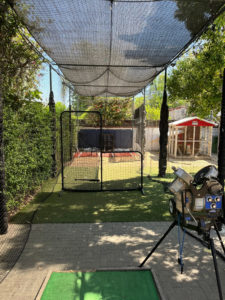
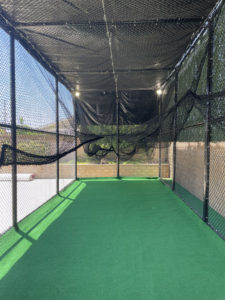
Ideal for: Professional-level training, serious athletes, or anyone looking to monetize a top-tier setup via CageList.
- Frames: Premium steel with anti-rust coatings. Built for long-term durability.
- Netting: Kevlar or pro-grade nylon. Maximum strength, weatherproof, and high-impact tested.
- Size: Often custom-sized (70+ ft). Full cage batting experience.
- Installation: Professional only. Permanent and heavy-duty foundation (e.g., turf + concrete).
- Extras: Advanced pitching machines, LED lighting, ball return systems, and security features.
Pros: Long lifespan, customizable, pro-level features, best safety.
Cons: Expensive, permanent, and complex to install.
🧠 Key Considerations Across All Budgets
- Durability: Cheap cages = short lifespan. Premium cages = multi-year investment.
- Safety: Prioritize netting strength, frame stability, and anchor quality.
- Maintenance: Turf needs cleaning; steel needs rust checks; netting needs UV protection.
- Use Case: Pick your tier based on how often you’ll train — and how seriously.
🔗 Visit our Batting Cage Guide Hub for more resources on netting, flooring, installation tips, and gear reviews.
🧱 Real Backyard Builds in Arizona
- 📍 San Tan Power Alley — San Tan Valley, AZ
- 📍 AZ Prime Athletics — Chandler, AZ
- 📍 Phoenix Backyard Cage w/ L-Screen & Tee — Phoenix, AZ
- 📍 Bennett’s Home Run Stadium — Queen Creek, AZ
⚾ Want to build a cage that pays for itself? List your cage on CageList and join a growing community of backyard cage owners earning money by sharing their space.
